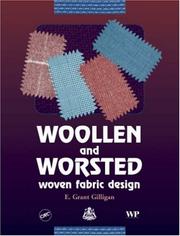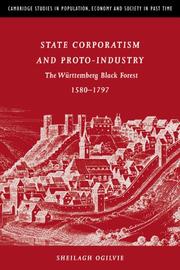| Listing 1 - 2 of 2 |
Sort by
|

ISBN: 1855737434 1845693175 1845693167 9781845693169 0849325870 9780849325878 9781855737433 9781845693176 9780203024003 0203024001 Year: 2004 Publisher: Cambridge, England : Woodhead Publishing Limited,
Abstract | Keywords | Export | Availability | Bookmark
 Loading...
Loading...Choose an application
- Reference Manager
- EndNote
- RefWorks (Direct export to RefWorks)
Today it is as essential as ever to design, develop and produce saleable and commercially sound woven fabrics within considerable financial restraints. However, in teaching woven fabric design, emphasis appears to have shifted away from the practicalities of cloth construction and design development. This practical handbook provides explanations and answers to some of the technical and practical problems encountered in the development, design and manufacture of woollen and worsted woven fabrics.
Wool fabrics. --- Woolen and worsted weaving. --- Fabrics, Wool --- Woolen fabrics --- Woolens --- Woollen fabrics --- Woollens --- Textile fabrics --- Weaving --- Woolen and worsted manufacture

ISBN: 0521372097 0521025842 0511582862 0511003986 9780511003981 9780511582868 Year: 1997 Volume: 33 Publisher: Cambridge : Cambridge University Press,
Abstract | Keywords | Export | Availability | Bookmark
 Loading...
Loading...Choose an application
- Reference Manager
- EndNote
- RefWorks (Direct export to RefWorks)
State Corporatism and Proto-Industry focuses on an industrial countryside in south-west Germany, where a dense worsted industry dominated the rural economy from 1580 to 1800. This is an example of 'proto-industry', the dense, export-oriented rural manufacturing which arose throughout Europe before factory industrialization. But although the Württemberg worsted industry possessed all the features of a classic proto-industry, closer scrutiny throws doubt on basic assumptions about European proto-industrialization. In this book, Sheilagh Ogilvie shows that proto-industries did not break down traditional society. Instead, corporate institutions such as guilds, merchant companies, village communities and manorial systems retained enormous power. This was a result of 'state corporatism': the expanding early modern state granted privileges to favoured groups in return for fiscal and regulatory co-operation. As Ogilvie shows, these corporate privileges profoundly constrained both individual decisions and economic development.
Guilds --- Industrialization --- Municipal franchises --- Weavers --- Woolen and worsted manufacture --- Woolen goods industry --- History. --- Tisserands --- Lainages --- Laine --- Corporations --- Industrialisation --- History --- Histoire --- Industrie --- Wildberg (Baden-Württemberg, Germany) --- Wildberg (Bade-Wurtemberg, Allemagne) --- Economic conditions --- Conditions économiques --- Wildberg (Baden-Württemberg, Alemania) --- Condiciones económicas. --- Industria de la madera --- Alemania --- Wildberg (Baden-Württemberg) --- Historia. --- Condiciones sociales. --- Arts and Humanities --- Economic conditions. --- Social conditions.
| Listing 1 - 2 of 2 |
Sort by
|

 Search
Search Feedback
Feedback About UniCat
About UniCat  Help
Help News
News